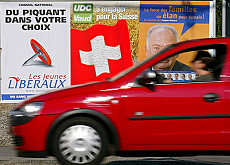
Parties prepare to dig deep

Switzerland's four main political parties will spend more than SFr1 million ($820,000) each on October's federal elections.
But while the outlay for their local sections will be even bigger, the amounts injected into the campaign are tiny compared with countries like the United States.
The centre-right Radical Party has already budgeted SFr1.3 million for the elections. According to its general-secretary Guido Schommer, the party’s cantonal sections will invest a “multiple” of the same sum.
The Radicals will be spending some of this money to train candidates and to teach them how to toe the party line. However there will be no electoral machine built up to handle the extra workload and the party committee plans to put in plenty of overtime.
For the Christian Democrats, the other centre-right party, the budget should be between SFr1.2 million and SFr1.5 million this year. Much of this money will be used for advertising, including 20 per cent for a poster campaign.
The Christian Democrats’ secretary-general, Reto Nause, reckons direct mailing to voters will account for another 30 per cent of this year’s electoral war chest. The party is also hiring a team of part-timers to coordinate work between the national committee and the cantonal sections.
The centre-left Social Democrats plan to spend around SFr1.2 million. Five people are working on the campaign at the national level, although most of their time is spent on coordination with the cantons.
The fourth governmental party, the rightwing People’s Party, will spend SFr1 million on communicating on what it calls a “series of national issues” by the end of August, according to its central secretary, Roman Jäggi.
The cantonal sections will then take over as the party feels the fight for voters’ hearts and minds will be a local affair.
The Greens, who are widely expected to make gains at the elections, are not planning on spending big. Their budget at the national level is at most SFr50,000 this year says their deputy secretary-general, Miriam Behrens.
“We will be putting in a lot of legwork,” she added. “The cantonal sections will be the ones spending, somewhere between SFr1 million and SFr1.5 million.”
Funding sources
The parties all say they will be paying particular attention to the origin of funds donated for the elections. The Social Democrats will examine the sources of all major donations.
The People’s Party has a rule which forces the cantonal sections to know about personal gifts to candidates, while the Radicals have warned their sections that they are responsible for vetting funds.
The Christian Democrats have called on their candidates and sections to shoulder the responsibility for checking the origin of donations.
Nause says though that gifts of SFr10,000 or more are exceptional and that only 40 per cent of the campaign costs are covered by donations, with the rest coming from inside the party.
There are no Swiss regulations on political funding, although the Social Democrats would like to convince voters that a law on election finances is necessary.
Pocket money
The sums being bandied about by Switzerland’s politicians would probably make their counterparts elsewhere smile though.
The 2004 presidential election in the United States cost the Republicans and the Democrats more than $650 million, with candidates from both parties turning down federal funds to avoid a spending cap.
Last year’s Congressional elections saw huge amounts being spent too. In six states, the cost of various Senate races exceeded $30 million.
In Britain’s 2001 parliamentary elections, spending reached more than £26 million (SFr62.42 million), with nearly 90 per cent of expenditures made by the Labour and Conservative parties.
For the upcoming French presidential elections, there is a spending cap. Each candidate can spend a maximum of €16.116 million (SFr26.34 million) for the first round and €21.594 million for the second.
swissinfo with agencies
In Britain, parties do not receive any direct state funding for the election campaign. Each party is allocated time on all TV channels simultaneously, an allocation that reflects their size in parliament. There are limits on campaign expenditure by each candidate but not by the party.
In Canada, candidates and parties have their election expenses partially reimbursed. Any candidate who receives at least ten per cent of the vote gets 60 per cent of election and personal expenses. Any political party that receives two per cent of the national vote can receive half of its election expenses.
Australian political parties are funded for federal elections depending on their electoral popularity. Expenses are reimbursed depending on vote share. The total amount is set by parliament and the allocation is done by the Australian Electoral Commission.
In the US, qualified presidential candidates receive federal funds to pay for expenses of their campaigns in both the primary and general elections. To qualify for public funding, candidates must meet requirements such as agreeing to limit campaign spending to a specified amount.

In compliance with the JTI standards
More: SWI swissinfo.ch certified by the Journalism Trust Initiative

























You can find an overview of ongoing debates with our journalists here . Please join us!
If you want to start a conversation about a topic raised in this article or want to report factual errors, email us at english@swissinfo.ch.